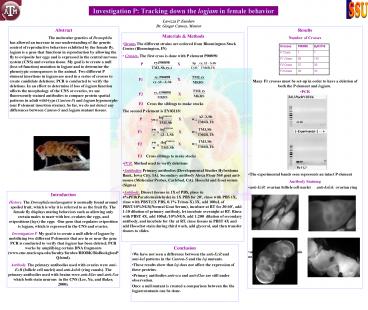Abstract - PowerPoint PPT Presentation
1 / 1
Title:
Abstract
Description:
... in logjam are used in a series of crosses to create candidate deletions; PCR ... Dr. Ginger Carney, Mentor. 10. 33. F3 Cross. 25. 37. F2 Cross. 110. 93. F1 ... – PowerPoint PPT presentation
Number of Views:30
Avg rating:3.0/5.0
Title: Abstract
1
Investigation P Tracking down the logjam in
female behavior
Lavezza P. ZandersDr. Ginger Carney, Mentor
Abstract The molecular genetics of Drosophila
has allowed an increase in our understanding of
the genetic control of reproductive behaviors
exhibited by the female fly. logjam is a gene
that functions in reproduction by allowing the
fly to oviposite her eggs and is expressed in the
central nervous system (CNS) and ovarian tissue.
My goal is to create a null (loss-of-function)
mutation in logjam and to determine the
phenotypic consequences to the animal. Two
different P element insertions in logjam are used
in a series of crosses to create candidate
deletions PCR is conducted to verify the
deletions. In an effort to determine if loss of
logjam function affects the morphology of the CNS
or ovaries, we use fluorescently stained
antibodies to compare protein spatial patterns in
adult wild-type (Canton-S) and logjam hypomorphs
(our P element insertion strains). So far, we do
not detect any differences between Canton-S and
logjam mutant tissues.
- Results
- Number of Crosses
- Many F1 crosses must be set-up in order to have a
deletion of both the P element and logjam. - PCR
- Materials Methods
- Strains The different strains are ordered from
Bloomington Stock Center (Bloomington, IN) - Crosses. The first cross is done with P element
P00898 - P ?
X ? - F1 ?
X ? - F2
X
F3 Cross the siblings to make stocks - The second P element is EY03118
- P ?
X ? - F1 ?
X ? - F2 ?
X ? - F3 Cross siblings to make
stocks - PCR. Method used to verify deletions
- Antibodies Primary antibodies (Developmental
Studies Hybridoma Bank, Iowa City, IA). Secondary
antibody Alexa Flour 568 goat anti-mouse
(Molecular Probes, Carlsbad, CA). Hoescht and
Goat serum (Sigma) - Antibody. Dissect tissues in 1X of PBS, place in
4PFD(Paraformaldehyde) in 1X PBS for 20, rinse
with PBS 1X, rinse with PBST(1X PBS, 0.1
Triton-X) 3X, add 100uL of PBST/10NGS(Normal
Goat Serum), incubate at RT for 30-60, add 110
dilution of primary antibody, let incubate
overnight at RT. Rinse with PBST 4X, add
100uL/10NGS, add 1200 dilution of secondary
antibody, and incubate for 1hr at RT, rinse
tissues in PBST 4X and add Hoeschst stain during
third wash, add glycerol, and then transfer
tissues to slides.
Crosses P00898 Ey03118
P Cross 7 7
F1 Cross 93 110
F2 Cross 37 25
F3 Cross 33 10
Introduction History. The Drosophila melanogaster
is normally found around spoiled fruit, which is
why it is referred to as the fruit fly. The
female fly displays mating behaviors such as
allowing only certain males to mate with her,
ovulates the eggs, and ovipositions (lays) the
eggs. One gene that regulates oviposition is
logjam, which is expressed in the CNS and
ovaries. Investigation P. My goal is to create a
null allele of logjam by mobilizing two different
P elements that are in or near the gene. PCR is
conducted to verify that logjam has been deleted
PCR works by amplifying certain DNA fragments
(www.emc.maricopa.edu/faculty/farabee/BIOBK/BioBoo
kglossPQ.html). Antibody. The primary
antibodies used with ovaries were anti-EcR
(follicle cell nuclei) and anti-kelch (ring
canals). The primary antibodies used with brains
were anti-Elav and anti-Sca which both stain
neurons in the CNS (Lee, Yu, and Baker, 2000).
- Conclusion
- We have not seen a difference between the
anti-EcR and anti-kel patterns in the Canton-S
and the loj mutants. - These results show that loj does not affect the
expression of these proteins. - Primary antibodies anti-sca and anti-Elav are
still under observation. - Once a null mutant is created a comparison
between the the logjam mutants can be done.































